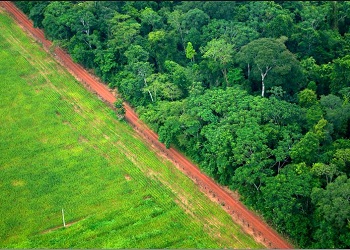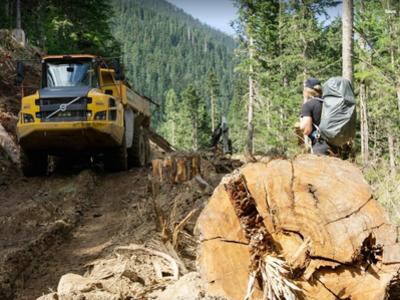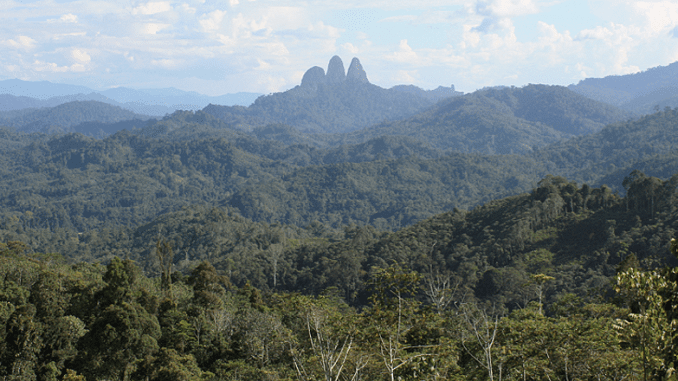
BARAM, Sarawak, Malaysia, July 25, 2022 (ENS) – Indigenous Penan communities have filed a police report and erected blockades to put a permanent stop to logging of the mountain Batu Siman in northern Sarawak, a Malaysian state on the island of Borneo, according a statement issued on their behalf by the nonprofit Borneo Project and the Bruno Manser Fund, a Swiss NGO.
While the logging company claims it has signed permission to cut timber from the indigenous inhabitants, the Penan assert that they never agreed to any logging in the area around the Batu Siman mountain, a culturally sensitive area that could become part of the Baram Peace Park. This community initiative is designed to protect Sarawak’s last islands of primary forest, celebrate local cultures, and develop sustainable livelihoods.
The vision is spearheaded by Indigenous communities in the upper reach of the Baram River in northern Sarawak who want to stop logging in their ancestral lands and develop alternative income sources.
The park is currently being negotiated with the Sarawak government and communities are discussing the scope and character of the park. The final form of the park depends on the outcome of these community discussions.
The Malaysian community organizations Keruan and SAVE Rivers as well as the Bruno Manser Fund and the Borneo Project are supporting the communities in their process to establish the Baram Peace Park.
The Penan state that in May and June, Samling Timber Malaysia encroached into this culturally sensitive area, which already is part of a government-supported conservation initiative, the Upper Baram Forest Area, UBFA. The communities filed the police report on the encroachment on July 9. Six days later Samling pulled out their timber harvesting machinery and left the area.
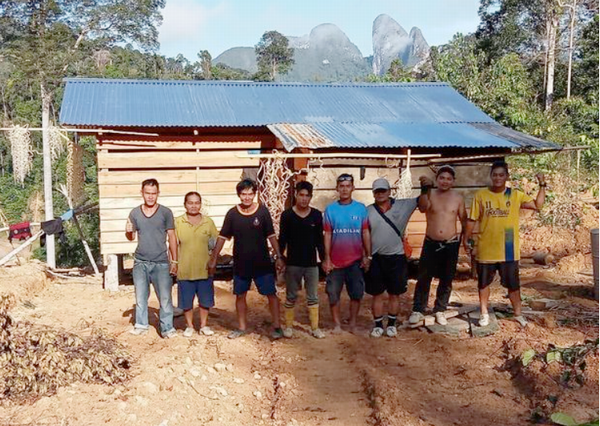
On July 16 the Penan from three villages – Long Ajeng, Long Lamam and Long Murung – erected blockades across two of Samling’s roads, one leading into the conservation area and one into a community use zone of the Upper Baram Forest Area.
The Penan decided to build blockade houses across the roads instead of simple barricades to signal their determination to permanently stop timber extraction. Their message, “The communities and the blockades are here to stay.”
The Penan headmen of the three villages are happy that timber extraction has stopped and said in today’s statement, “Our communities are very proud that Samling has stopped destroying the forest around the UBFA core zone. We hope that logging will never again encroach into any of the 18 Penan communities under the UBFA.”
“As long as the company respects our rights, there will be no conflict,” the Penan headmen said. “Thanks to all those who are concerned about our plight, who have highlighted our concerns and lobbied locally and internationally for our rights.”
Samling takes exception to a Penan statement issued by the Bruno Manser Fund on July 13 asserting that Samling had encroached into the culturally sensitive area.
“Samling would like to categorically deny that it has encroached into any area recognised as Native Customary Rights or NCR land by the Sarawak state government. We also categorically deny that
we have encroached into any forest earmarked for conservation by the Sarawak authorities,” Samling said in a statement July 20.
“The so-called Upper Baram Forest Area mentioned in the statement is a concept that has not been ratified by the state authorities, and one that has not been discussed with Samling even though
we are the concessionaire holders for most of the areas covered under the concept,” Samling stated.
“We reiterate that the issue of encroachment does not arise because Samling is in possession of all necessary licences and permits to carry out timber harvesting in the area. This area does not
encroach into the areas inhabited by the Penan communities of Long Ajeng, Long Lamam and Long Murung,” the company stated.
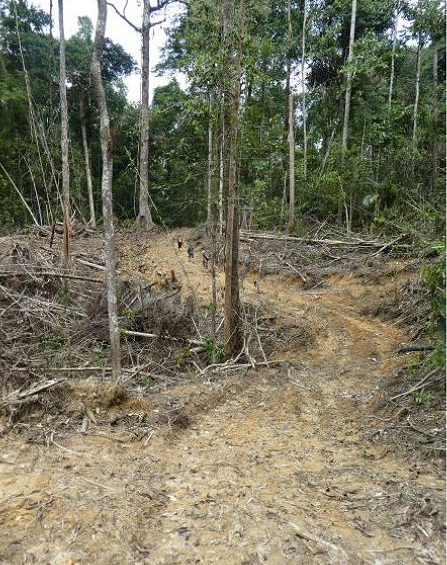
The Penan say that Samling previously encroached into Penan territory in 2021. The logging stopped when the community lodged a police report and erected a blockade, however the company resumed timber extraction after only a brief pause.
Komeok Joe, head of the Penan organization Keruan, said, “We really hope that Samling left the area for good this time. The Penan are very committed to implement the Upper Baram Forest Area together with the Sarawak government. We are looking forward to collaboratively protecting our forests.”
Within the traditional Penan homeland are all the major forest types that grow inland from the coast of Borneo – forests that shelter a multitude of rare and imperiled endemic species.
Many of Borneo’s plants are endemic, found nowhere else in the world. About 5,000 species, or 34 percent of flowering plants found on the island fall in this category, according to the conservation NGO WWF.
There are 30 unique birds and 39 endemic mammals, including the critically endangered Sumatran rhino and the orangutan. One survey of 22 acres identified over 700 species of trees, more than have been reported for all North America.
In a 1993 article in “Cultural Survival Quarterly,” Canadian cultural anthropologist, ethnobotanist, author, and photographer Wade Davis wrote, “For the Penan, this forest is alive, responsive in a thousand ways to their physical and spiritual needs.”
“Its products include roots that cleanse, leaves that cure, edible fruits and seeds, and magical plants that empower hunting dogs and dispel the forces of darkness,” Davis wrote. “There are plants that yield glue to trap birds, toxic latex for poison darts, rare resins and gums for trade, twine for baskets, leaves for shelter and sandpaper, and wood to make blow-pipes, boats, tools, and musical instruments. All these plants are sacred, possessed by souls and born of the same earth that gave birth to the people. ‘From the forest,’ they say, ‘we get our life.'”
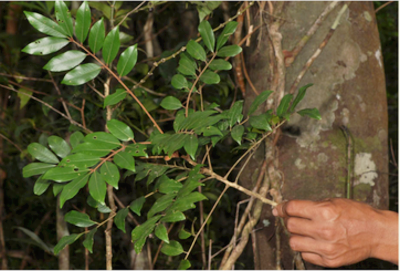
The conservation group WFF is bringing public attention to the plants in Penan territory on Borneo that can be valuable in fighting stubborn diseases such as leukemia, Ebola, Zika and coronaviruses, literally bringing life to the world. One example is a genus of Sarawak tree producing a substance that can kill dozens of kinds of human cancer cells. In 2010, a Sarawak regulation written by the Sarawak Biodiversity Center declared two species of these trees to be protected resources.
Other breakthroughs include compounds found in tree latex which can cure a wide range of HIV strains, and antimalarial substances found in the bark of the langsat tree.
Environmental conservation is an integral part of the Penan way of life. As Davis writes, “Stewardship permeates Penan culture, dictating the manner in which Penan use and share the environment. This notion is encapsulated in molong, a concept that defines both a conservation ethic and a notion of ownership. To molong a sago palm is to harvest the trunk with care. Molong is climbing a tree to gather fruit rather than cutting it down, harvesting only the largest fronds of the rattan, leaving the smaller shoots so they may reach proper size in another year.”
With a system of markings cut into tree bark, “the Penan acknowledge specific resources – a clump of sago, fruit trees, dart-poison trees, rattan stands, fishing sites, medicinal plants – as familial rights that pass down through the generations,” Davis explains.
The Penan are skilled naturalists, with sophisticated interpretations of biological relationships, Davis recognizes. “A recent and cursory examination of their plant lore suggests that the Penan recognize over 100 fruit trees, 50 medicinal plants, 8 dart poisons, and 10 plant toxins used to kill fish. These numbers probably represent but a fraction of their botanical knowledge.”
Featured image: The territory of the proposed Baram Peace Park with Batu Siman mountain in the background. (Photo courtesy Bruno Manser Fund)

